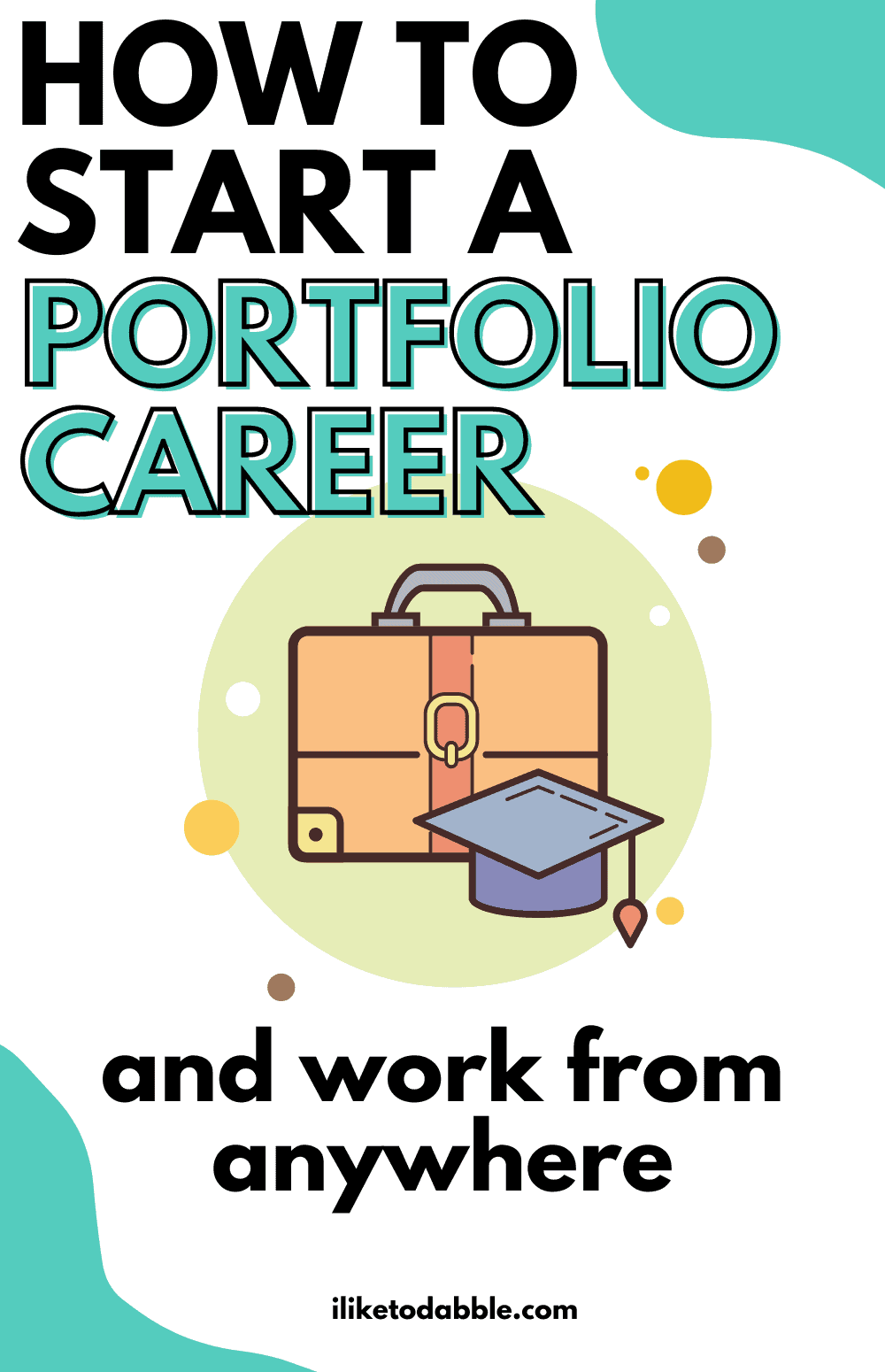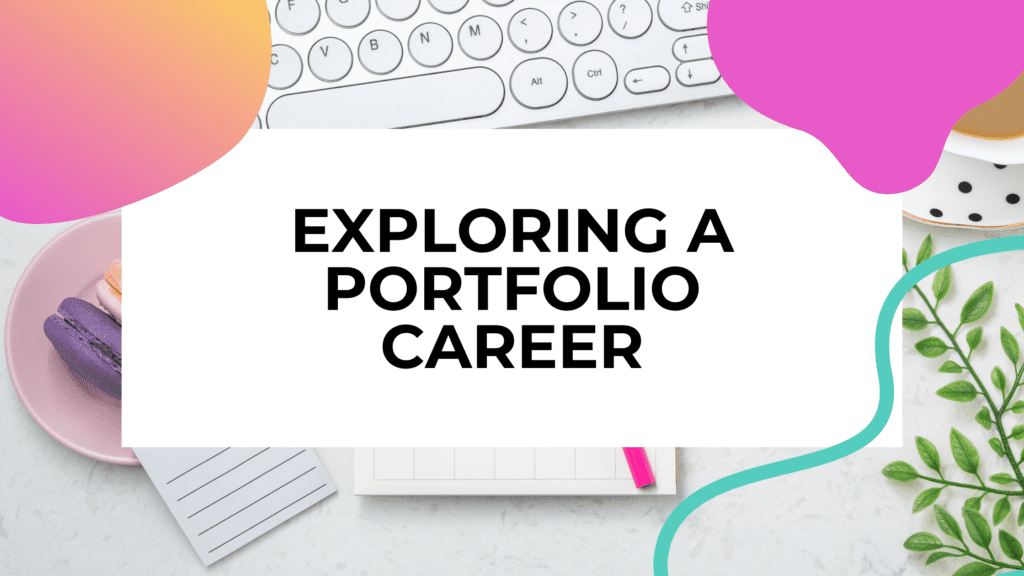Our website is supported by our users and contains affiliate links. We get paid when you purchase or sign up for anything through those links. Read the full disclaimer for more information.
Last Updated on February 13, 2023 by Daniella
A portfolio career might be the new way you define your work.
I was scrolling through TikTok one day when I came across a video that said that calling your income streams “side hustles” could negatively impact your mindset around the work you do. Using a term like “portfolio career” more accurately represents a multihyphenated approach to work without diminishing it.
They depicted this reframe with the idea that the wealthy don’t call what they do for money “side hustles” and it did have me thinking. Could this just be another rebranding of the term “side hustle” (and a classist one at that)? In a way, yes. But the word “side hustle” has been rebranded and rebranded many times before.
Then this TIME article hooked me on to the term.
I personally love the idea of reframing a collection of our work as a “portfolio career”. It gently forces me take a more organized and intentional approach to my work — much like an actual portfolio, but a portfolio of passions. It also happens to perfectly represent what I do as a former software engineer and now current writer, blogger, educator, and business owner.
Table of Contents
What is a Portfolio Career?
A portfolio career is essentially a collection of the different ways you make money. In the past, this has been called “multihyphenate”, “multi passionate”, and “slashers”.
A portfolio career involves monetizing your skills in a variety of ways that generate multiple income streams. These could be different and separate jobs, or they could be the different income streams within a business that you operate. What might also be called a “side hustle stack” is also a portfolio career.
For example, when I had my day job as a software engineer and would spend my nights blogging, I was a software engineer/blogger. That was a portfolio career of two entirely separate careers that were also separate jobs: one that was a w2 job and one that was freelance.
After leaving that job to run my blog as a business full time, I took my portfolio career one step further in a more focused direction. I was now a blogger, freelance writer, educator, and business owner.
The biggest element to a portfolio career is self management — I decide when I work, how long I work, who I work with, and how much I charge. I don’t answer to anyone but I do have to confront myself to get my job done. If your portfolio career involves a w2 job, you have to do all of that on top of being an employee with another set of expectations and responsibilities.
Related: How To Balance a Side Hustle With a Full Time Job
Examples of a Portfolio Career
Some popular examples of a portfolio career are when someone is a photographer and designer, a writer and illustrator, or a author and podcast host.
We actually see tons of portfolio career examples in our everyday life online and offline. Some online examples are several of your favorite YouTuber’s also make money in several other different ways like selling digital products and merchandise online, selling tickets to meetups and live shows, partnering with brands for projects, and writing projects in addition to the writing they’re doing for their own YouTube channel.
Several online careers actually operate like this such as blogging, podcasting, streaming, freelancing, and more digital careers.
Refer to these other portfolio career examples:
- How One Actress Took The Leap Into Entrepreneurship
- How Cassandra is Side Hustling Her Way to Full Time Blogging
- How Danielle Creates Passive Income as an Author, Blogger, & Podcaster
- How Jannese Built a 6 Figure Network of Side Hustles
- How Baylee Started Her Blog & Coaching Business
- How This Former Creative Director is Running Her Own Creative Business
- How This Professional Cosplayer Monetizes Her Craft
Is a Portfolio Career Right for You?
How do you know if a portfolio career is right for you? If you want to do everything, a portfolio career is probably right up your alley. Fellow ADHD kids, I’m looking at you. You were never wrong to not be able to hone in on one thing you wanted to do. A portfolio career might’ve made more sense for working with ADHD than a traditional one.
The status quo of how most career’s go in The American Dream is people would stay in the same field and even at the same employer for 20 – 30 years or more. That rarely happens anymore as people are becoming more independent with how they work. Not to mention, companies are burning out their employees.
It only makes sense that the career of the future is a portfolio approach where we no longer depend on one income stream and employer but instead take over the employer role and multiply the way we bring in money.
You can still keep an employer for financial stability as you start up a business on the side, which is exactly what I did for many years. And you can have a portfolio career with many employers, with 1 employer and yourself for the other, or yourself as self-employed.
Pros and Cons of a Portfolio Career
There are several pros and cons to a portfolio career, but it depends on the person and what type of work they prefer.
If you’re someone who is happy doing one job and one job only, that’s great. Keep doing that.
If you’re someone who thrives with different challenges from different types of work that help you to develop new skills and explore yourself deeper – whether that’s to build your personal brand or just because you’re curious – a portfolio career is probably going to be your route.
Here are some of the pros and cons to this path.
The Benefits of a Portfolio Career
There are quite a few benefits to having a portfolio career.
Some of these include:
- Diversify your skillset and get to know your skills better.
- Increase your income.
- Test out different careers and jobs.
- Work remotely in your own business.
- Fulfillment from trying things you are passionate and curious about.
- Protects your future as it keeps you flexible.
- More control over your skills, income, and identity.
The Downsides to a Portfolio Career
With every positive, there is a negative.
These are some of the caveats to a portfolio career:
- It may be difficult to keep your days balanced and organized.
- Work can be stressful with getting used to constantly pitching and marketing yourself.
- Your friends and family might not understand and discourage your efforts.
How to Start a Portfolio Career
I never officially launched my own portfolio career. When I wanted to try something new on the side of my day job in I.T. , I started Googling those things I wanted to learn to see how to get started.
There was a lot of self teaching happening and I did a lot of jumping in scared to learn new skills. I often sought out free resources I could find online for freelance writing and blogging. Free online courses are also available for a wide variety of skills, jobs, and business ideas.
What’s Your Why?
Know why you’re exploring a portfolio career. Are you doing it to brand yourself better for career opportunities, for flexibility, or you need help deciding a career path? This will help you plan out what you actually want to do, how you work, how you’ll be successful, and what success even means to you.
What Skills Will You Monetize?
What do you like to do? When you think of all the skills you use at your day job, which ones would you still do happily for free?
Those are the skills you can start thinking about monetizing. One example of monetizing a skill is writing. If you want to decide exactly what you would write to make money, think of a topic you enjoy talking about and that you can easily write about. You can freelance write in that subject, blog about that subject, write scripts for YouTubers in that subject, edit work for authors, or write your own works like ebooks for physical books.
Look For a Need to Fill
If you want to stand out in the subject you are monetizing your skill in, or otherwise called “niche“, look for the gaps. What are people in your niche not talking about?
Using the example previously given: what are writers in your niche not writing about?
When you’re thinking of a need to fill, you have to think who the need is even for. Who do you want to serve?
Is there a take out there that no one is talking about? Is there a way that you can connect with people that others can’t?
That is where you can start to find your people, potential clients, readers, whatever you call the people that appreciate your skill.
Learn About Branding and Marketing
Once you have an idea of what you can offer and who you can offer it to, think about the packaging of it. This is called your branding and marketing.
Branding is how you make your clients feel while your marketing is your messaging. Come up with a unique way that you help people in a way that others don’t, Something that makes you the go-to person in your niche.
This is a great free course to get started with self marketing.
Build Relationships
Your network is the most valuable part of your portfolio career. Maintain relationships with several contacts across the different work you do for mentorship, advice, to find work, clients, or to just stay connected. Linkedin and Twitter seem to be the best routes for this in my current portfolio career.
Your Career in Multifaceted
Your career is not something that has to remain fixed for your entire working life. It is forever changing and evolving. You’re allowed to explore different things as you change and evolve alongside your work.
Sometimes, you might even find yourself accidentally trying a portfolio approach to working as you found past work cultures to be too toxic to continue working in. When this happens, it can be stressful to try a new way of making money where more responsibility is on you to pitch clients for work versus a stable paycheck incoming every 2 weeks regardless of how much work you did.
When deciding on if you want to try a portfolio career, keep your mental health in mind and make sure to plan for rest.
Whatever you decide to do, know that nothing is permanent. You can and should decide to do whatever feels the best for you wherever you are in your career and working situation.
Related:
- LGBTQ+ Career Resources
- How to Get a Remote Job: The Ultimate Guide
- The Only Guide You’ll Ever Need for Including Side Hustles on Your Resume
- LGBTQ Books to Help Navigate Money, Work, & Beyond
Pin it for later!


Daniella is the creator and author of iliketodabble.com. When their wife Alexandra and them aren’t globetrotting or playing with their 7+ animals, they are dabbling and working towards a future of financial freedom.

